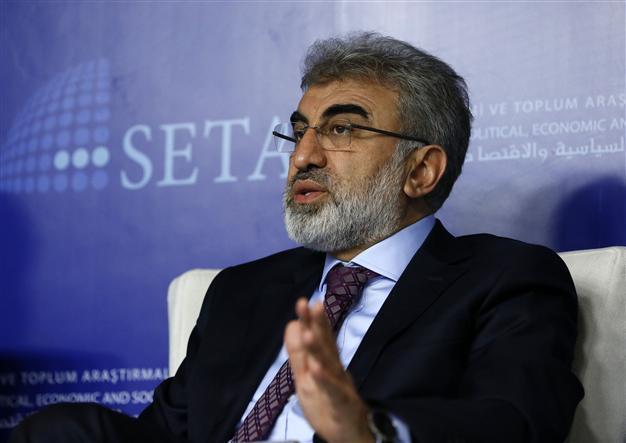ISIL attacks have a negative effect on energy projects: Turkish energy minister
ANKARA

Energy Minister Taner Yıldız says total exports of Iraqi oil through Turkey since May have reached 18 million barrels, despite ongoing tension in the region. AA Photo
Attacks committed by the Islamic State of Iraq and Levant (ISIL) have had a negative effect on energy projects around Kirkuk and Mosul, but oil shipments from Iraq have experienced no problems so far, Turkish Energy Minister Taner Yıldız has said.
“After the peshmerga [Kurdish forces of northern Iraq] retook control of some oil fields, oil shipments began to rise. Some 240,000 barrels of oil were shipped just yesterday, a dramatic rise from around 100,000 barrels before. We are working to keep unproblematic oil shipments. Iraq needs more oil income right now and we are ready to ship seven-fold of what we ship today,” Yıldız said in a live interview on private broadcaster NTV on Oct. 20.
He added that total exports of Iraqi oil through Turkey since May have reached 18 million barrels, despite ongoing tension in the region.
Yıldız also touched on Turkey’s possible problems with meeting its gas demand due to the ongoing tension between Russia and Ukraine, admitting that there was a possibility of a supply crisis.
“We may face some problems with meeting our gas demand, but we see some progress after the negotiations between the European Union, Ukraine and Russia. Some revisions were made in gas prices,” he said.
“Let’s have a look at Turkey’s position in this equation: We generate half of our electricity from imported natural gas. Half of this gas comes from Russia, mainly via Ukraine. Some 12.5 percent of our gas needs come via Ukraine. This is huge. We hope not to face a big gas crisis, but we also admit that there is such a possibility,” he added.
An interim natural gas deal between Moscow and Kiev, reached last weekend, could supply just enough to get Ukraine through the winter, as long as the weather does not become unusually cold.
Russia, Ukraine and the European Commission moved towards an agreement in late September and made further progress last weekend, and the deal is expected to be finalized at meetings between officials in Brussels today.
Russia cut off the gas supply to Ukraine in mid-June following more than two years of disagreement over the price and after relations between the two countries deteriorated over Moscow’s annexation of Crimea and fighting in the east of Ukraine.
Electricity and gas prices in Turkey increased by 9 percent at the end of September, effective for three months starting Oct. 1, after two years of no increases, mainly due to the depreciation of the Turkish Lira.
Yıldız asked for a discount on the price of gas Turkey buys from Russia during talks in Moscow in October. Russia’s Gazprom is now working on a detailed price package in line with Turkey’s demand for a discount on natural gas prices, Gazprom Vice President Alexander Medvedev said earlier this month.
Yıldız said Turkey’s state-run pipeline company BOTAŞ had lost 2 billion liras annually as it did not raise gas prices for the good of the public. “We are now asking for a discount in gas prices abroad. We will see how much of a discount we can get after the negotiations,” he added.
